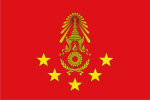Kris Sivara
General Kris Sivara (Thai: กฤษณ์ สีวะรา, rtgs: Krit Siwara, alternatively transcribed as Srivara) (27 March 1914 – 28 April 1976) was a military officer of the Royal Thai Army, a member of the Thai Cabinet, and deputy commander-in-chief of the Royal Thai Army during the violent crackdown on democracy protesters on 14 October 1973. He was later promoted to army commander.
During the Burma Campaign in World War II, Kris served as a company commander in a Phayap Army battalion under the command of Major Sarit Thanarat.
Kris was appointed Deputy Minister of Education by Field Marshal Thanom Kittikachorn in his 1969 government. On 23 November 1970, he was switched to Deputy Minister of Defence (Thanom was both premier and minister of defence). The government fell on 17 November 1971 after Thanom led a coup that overthrew his own government and abrogated the 1968 constitution. Thanom appointed Kris Minister of Industry in his subsequent junta.
Kris played a pivotal role in the 14 October democracy movement of 1973. Kris served as Deputy Army Commander in the face of massive public demonstrations against the "three tyrants": Colonel Narong Kittikachorn, Army Commander General Praphas Charusathien, and Prime Minister and Supreme Commander Thanom Kittikachorn. On the evening of 14 October, the police and army began shooting at demonstrators, killing at least 70. Narong shot into the crowds from a helicopter. Thanom and Praphas resigned from their political roles, but continued to lead the military. They ordered more troops to confront the remaining demonstrators, but were blocked by Kris. Thanom and Narong then resigned from their military positions. The king then appointed Sanya Dhammasakdi as premier. Kris was named defense minister in 1976, but died suddenly a week later.
However, Kris's role in the events was countered by Narong in a 2003 book. Narong blamed Kris, among others, for the violence. The book was strongly criticised by former student leaders.
The army's Kris Sivara Camp in Sakon Nakhon Province is named after him.
Honour
Foreign honour
-
 Malaysia : Honorary Grand Commander of the Order of Loyalty to the Crown of Malaysia (1973)[1]
Malaysia : Honorary Grand Commander of the Order of Loyalty to the Crown of Malaysia (1973)[1]
References
Sources
- Paul M. Handley, "The King Never Smiles" Yale University Press: 2006, ISBN 0-300-10682-3
- The Nation, Uprising: Narong 'is distorting history', 31 Aug 2003
